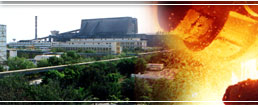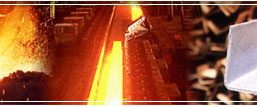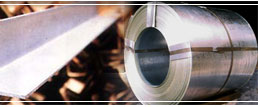After
independence in 1947, it did not take long
for Pakistan to come to the realisation that progressive
industrial and economical development would be impossible
without the possession of a self reliant iron and steel
making plant. The dependance on imports would cause
serious setbacks to the country along with an extortionately
high import bill which would be impossible to support.
The initial idea for a domestic iron
and steel mill was put forward in the first five year
plan of Pakistan (1955 - 1960). Debates over the manufacturing
process, supply sources of the requisite machinery and
raw materials, plant site, domestic ore versus imported
ore, ownership pattern, product mix and above all foreign
financing credit kept the project on hold for a considerable
time.
In 1968 besides other factors, it was
considered by the Government of Pakistan that a basic
steel industry should be established in the public sector,
as public sponsorship of the project would enable intergrated
development of the steel industry in the country. In
light of this, the government decided that the Karachi
Steel Project should be sponsored in the public sector
for which a separate Corporation under the Companies
Act be formed. As a result on the 2nd of July, 1968
Pakistan Steel Mills Corporation was setup as a private
limited company in the public sector in accordance to
the Companies Act of 1913, with the objective to establish
and run steel mills at Karachi and other places in Pakistan.
In January, 1969, Pakistan Steel concluded
an agreement with V/O Tiajproexport of the then USSR
for the preparation of a feasibility report into the
establishment of a steel mill at Karachi. Subsequently
in January, 1971 Pakistan and the USSR signed an agreement
under which the latter agreed to provide techno-financial
assistance for the construction of a coastal based intergrated
steel mill at Karachi.
The foundation stone for this gigantic
project was laid on the 30th of December, 1973 by the
then prime minister Mr. Zulfiqar Ali Bhutto. The mammoth
construction and erection work of the intergrated steel
mill, never experienced before in the country, was carried
out by a consortium of Pakistani construction companies
under the supervision of Soviet experts.
................................................................

Pakistan Steel did not only have to construct the main
production units but a host of infrastructure facilities
involving unprecendented volumes of work and expertise.
Component units of the steel mill numbering over twenty
and each a big enough factory in its own right were
commisioned as they were completed between April, 1981
to August, 1985 with the Coke Ovens and By Products
Plant coming online first and the Galvanising Unit last.
Commissioning of Blast Furnace Number 1 on the 14th
of August, 1981 marked Pakistan's entry into the elite
club of iron and steel producing nations. The project
was completed at a capital cost of Rs. 24,700 million.
The completion of the steel mill was formally launched
by General Zia-Ul-Haq the then President of Pakistan
on the 15th of January 1985.
Today Pakistan Steel is the country's
largest industrial undertaking having a production capacity
of 1.1 million tonnes of steel. The enormous dimensions
of the project can be visualised from the construction
inputs which involved the use of 1.29 million cubic
meters of concrete, 5.70 million cubic meters of earth
work (second to Tarbela Dam), 330,000 tonnes of machinery,
steel structures and electrical equipment. Its unloading
and conveyor system at Port Qasim is the third largest
in the world and its industrial water reservior with
a capacity of 110 million gallons per day is the largest
in Asia. A 2.5km long sea water channel connects the
sea water circulation system to the plant site with
a consumption of 216 million gallans of sea water per
day.
The above figures illustrate the massive
civil works, intricate erections, installations of sophisticated
electrical and mechanical equipment. With the completion
of Pakistan Steel, the local contractors gained the
technical ability till then unknown, which they utilised
later to undertake million dollar projects both within
the country and abroad especially the Middle East.
|




